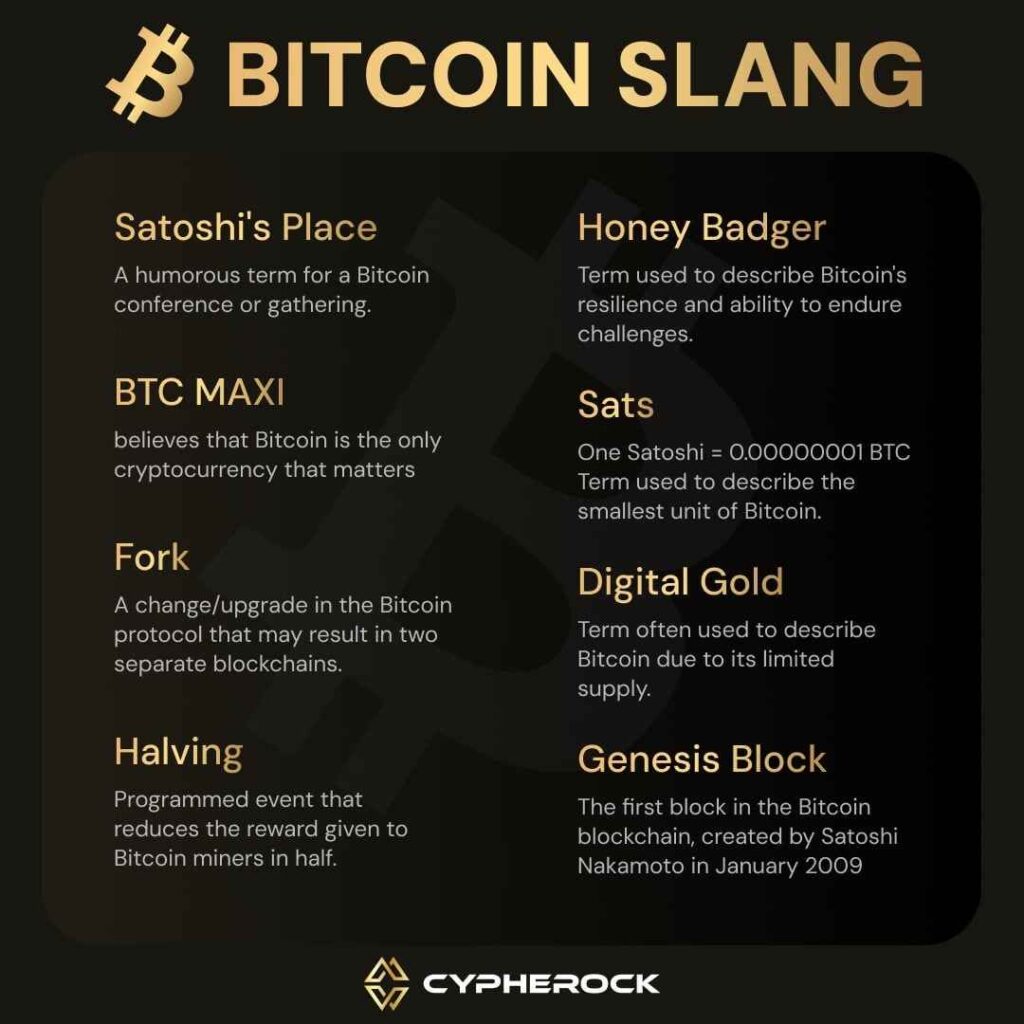Slang in the World of Cryptocurrency: A Guide to Understanding 25 Cryptocurrency Jargon and Definitions
Looking to enhance your cryptocurrency conversation skills? We’ve got you sorted.
If you’re new to the world of cryptocurrency, you’ve probably felt a bit lost when enthusiasts and investors start using unfamiliar terms. Ever wondered what these crypto terms mean? Well, fret not, because this is the cryptocurrency jargon that will help you navigate crypto-rich conversations!
1. WAGMI (We’re All Gonna Make It)

– WAGMI is a positive slogan within crypto culture, signifying the belief that if we make wise investments in solid cryptocurrency projects and stand together as a community, we will eventually reap significant returns. It’s akin to saying, “Have faith; good things come to those who wait, and we’ll all profit in due time.”
– Example: “Don’t worry, WAGMI, this project will recover.”
2. NGMI (Not Gonna Make It)
– The pessimistic counterpart to WAGMI, this is what crypto skeptics jestingly say to taunt crypto investors when prices are plummeting. It represents the gloomy perspective that certain coins or the overall crypto market are bound for failure.
– Example: “That meme coin is not gonna make it; it’s headed to zero.”
3. When Lambo?
– “Lambo” is a shortened form of Lamborghini, the luxury car of choice for many crypto investors. “When Lambo” is the humorous question investors ask when anxiously awaiting their crypto to “moon” (more on this below) or surge in value, so they can indulge in extravagant purchases.
– Example: “When Lambo? I can’t wait to buy one when this coin takes off.”
4. Bullish
– When you’re feeling “bullish,” it means you are optimistic about the prospects of a cryptocurrency, anticipating price increases. Bulls are those who drive the market upwards.
– Example: “I’m feeling bullish on Ethereum now, especially with all the recent developments.”
5. Bearish
– The opposite of being bullish, being “bearish” signifies a pessimistic outlook on cryptocurrency, with expectations of further price declines. Bears are the ones driving the market down.
– Example: “I’m quite bearish on this token; I think I’ll sell some of my holdings.”
6. To the Moon
– When someone says a cryptocurrency is “going to the moon,” they mean its price is expected to soar to incredible new highs.
– Example: “I’m telling you, this project is going to the moon during the next bull run!”
7. Degen
– Short for “degenerate,” “degen” describes high-risk trading and speculation, such as leveraged day trading or investing in dubious new crypto projects.
– Example: “That guy’s a total degen, putting his life savings into risky coins,” or “I’m feeling degen and thinking about diving into this new NFT release.”
These crypto terms should help you navigate and participate in crypto conversations more confidently.
8. The Flippening
The Flippening represents a speculative scenario where Ethereum’s market capitalization surpasses that of Bitcoin, thereby making ETH the leading cryptocurrency.
Context: “Should the Merge proceed without hiccups, the Flippening could materialize by year’s end!”
9. Not Financial Advice (NFA)
NFA is a disclaimer used to emphasize that the cryptocurrency opinions being shared are not professional financial advice from a licensed source.
Context: “Consider buying Shiba Inu now, but remember, NFA!”
10. Not Your Keys, Not Your Coins
This phrase underscores the critical importance of personally safeguarding the private keys to your cryptocurrency wallets and assets, as opposed to leaving them within a cryptocurrency exchange. Cryptocurrency exchanges are susceptible to hacking, bankruptcy, or account freezes.
In essence, “not your keys, not your coins” implies that true ownership of cryptocurrencies is only achieved when you control the private keys. Storing your crypto in a hardware wallet, where you manage the keys, is advisable.
11. Paper Hands
A “paper hand” characterizes an individual who quickly sells their cryptocurrency holdings at the slightest sign of price decline, lacking the resilience to endure market volatility. They panic and offload their crypto assets the moment they see red.
Context: “When Bitcoin experienced a 30% dip, those with paper hands sold everything!”
12. Diamond Hands
In contrast to paper hands, “diamond hands” describe investors who exhibit unwavering confidence in their chosen cryptocurrencies for the long term. Regardless of short-term market crashes or dips, they steadfastly refuse to sell.
These individuals possess conviction as unyielding as diamonds and remain unfazed by market fluctuations. They either retain their holdings or even purchase more during market downturns, while those with paper hands succumb to fear and sell.
Context: “You just need to maintain diamond hands and ‘HODL’ through the market’s ups and downs.”
13. Chad
In crypto circles, “Chad” is a slang term applied to someone who exudes self-assuredness, power, or success in the realm of cryptocurrencies.
Context: “That individual who correctly predicted the Bitcoin peak is a true Chad.”
14. Copium/Hopium
“Copium” denotes the tendency to engage in unrealistic consolation or rationalization when cryptocurrency prices are on a downward trend. On the other hand, “hopium” represents an excessive sense of optimism, even in the face of adverse developments.
Context: “Don’t indulge in copium when it comes to that particular altcoin; we are still within a bear market. Meanwhile, hopium is running high with Bitcoin!”
15. Jeet
“Jeet” is a crypto slang term derived from “did you eat?” but it is employed in the cryptocurrency world to inquire if someone has made significant profits.
Context: “I made substantial gains from that NFT drop. Jeet?”
16. No-Coiner
A “no-coiner” is an individual who does not own any cryptocurrency or holds a skeptical view of cryptocurrencies.
Context: “My father remains a no-coiner; he still does not comprehend my bullish stance on Bitcoin.”
17. S***coiner
“S***coiners” are traders who focus on purchasing high-risk altcoins with limited potential in the hope of achieving rapid wealth.
Context: “Refrain from being a s***coiner and conduct thorough research before investing in dubious tokens.”
18. SAFU
“Safety Assurance For Users” (SAFU) is abbreviated as “SAFU,” signifying security and stability in the realm of cryptocurrency. This term originated from Binance’s Secure Asset Fund for Users (SAFU), which provides a safeguard against market volatility. Binance’s CEO, Changpeng Zhao, frequently tweeted “Funds are safe,” which some users humorously adapted to “Funds are SAFU,” eventually becoming a distinct expression.
Context: “Do not worry, my friend; your coins are SAFU when stored on a hardware wallet.”
19. Crypto Whale
A “crypto whale” refers to an individual or entity possessing a substantial quantity of cryptocurrency, potentially capable of influencing market dynamics significantly through large trades or sales.
Context: “There are rumors that a crypto whale is preparing to offload 1,000 BTC into the market.”
20. Shill
In the cryptocurrency domain, “shilling” denotes the act of aggressively promoting or hyping a cryptocurrency asset, often in a less than candid manner.
Context: “Exercise caution when it comes to crypto influencers who are financially incentivized to shill meme coins.”
21. Bagholder
A “bagholder” characterizes a cryptocurrency investor who retains a cryptocurrency after experiencing a major price drop, effectively being stuck with devalued “bags” of crypto while hoping for a potential recovery that may never transpire.
Context: “I can’t believe I didn’t sell when my investment was up tenfold. Now I am burdened with these depreciated bags until the next bull run.”
22. Moonboy
A “moonboy” is someone who harbors unrealistically bullish expectations that cryptocurrency prices will skyrocket or “go to the moon.” They believe that every cryptocurrency will surge by a factor of a thousand, potentially making them rich, regardless of any contrary evidence.
Context: “Pay no heed to those moonboys on Twitter who envision Dogecoin reaching $10.”
23. Maxi
In cryptocurrency circles, a “maxi” is an individual who fervently believes that their favored cryptocurrency is the only legitimate one, dismissing all other cryptocurrencies as scams or worthless. They adamantly refuse to invest in anything other than their chosen cryptocurrency.
Context: “Those who staunchly support XRP cannot seem to refrain from criticizing every other altcoin project.”
24. Apeing
“Apeing” in cryptocurrency is the act of investing a substantial amount of money into a high-risk cryptocurrency asset or NFT without conducting due diligence or research.
Context: “I noticed that the new NFT release was being heavily promoted, and I impulsively ‘aped’ in $5,000 without much thought.”
25. Rug Pull
A “rug pull” denotes a fraudulent scheme in which cryptocurrency developers deliberately crash the price and abscond with investors’ funds. In such cases, the cryptocurrency’s liquidity is abruptly withdrawn, leaving investors with substantial losses.
Context: “Indeed, that DeFi coin turned out to be a scam; its creators executed a ‘rug pull’ and made off with everyone’s money.”
Now you possess a comprehensive understanding of the prevalent cryptocurrency slang terms
Enabling you to engage confidently in cryptocurrency-related discussions. While the cryptocurrency landscape evolves continuously, this glossary equips you with a solid foundation for deciphering cryptocurrency dialogues.

